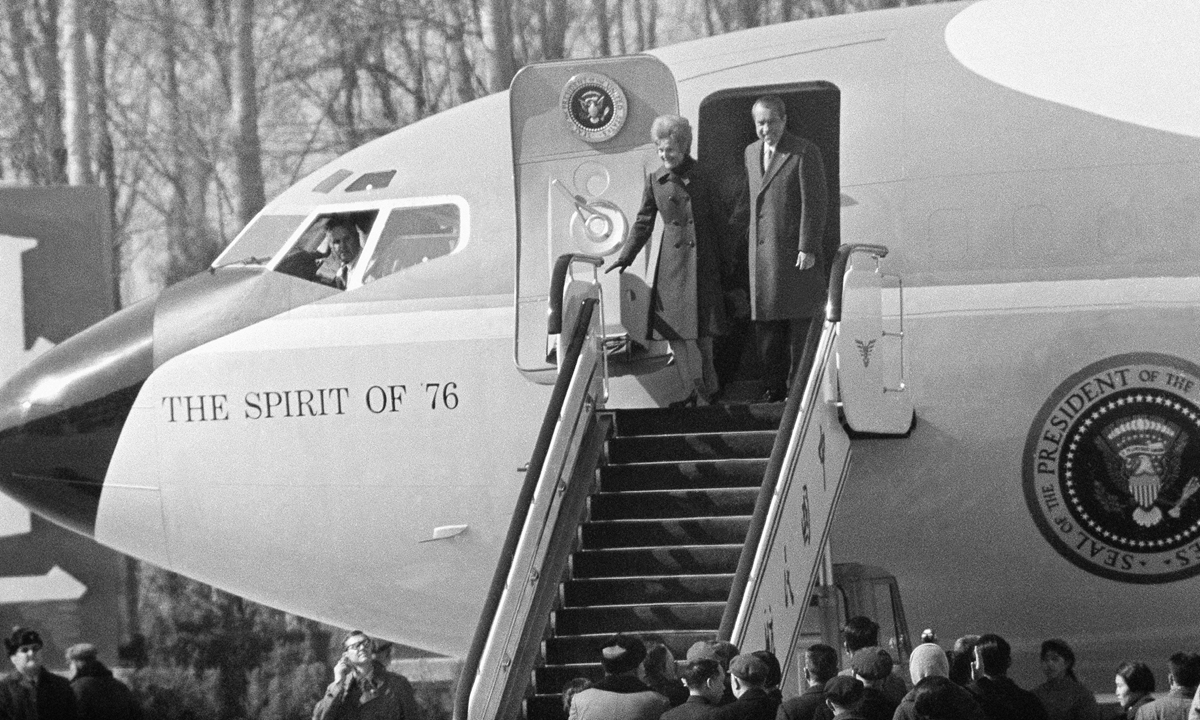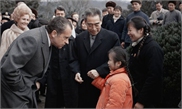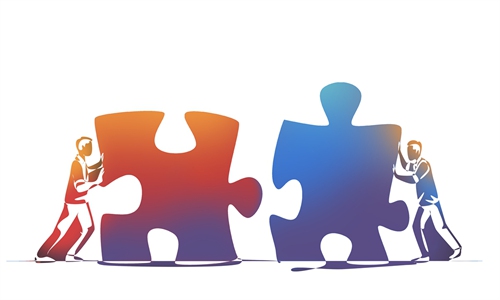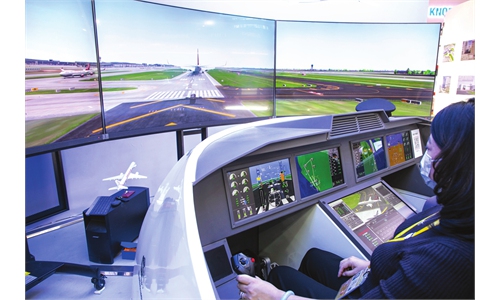Interpreter of China's former leaders recounts details of Nixon's historic meeting with Chairman Mao
This week marks the 50th anniversary of former US President Richard Nixon's one-week visit to China in 1972, which was hailed as a diplomatic breakthrough and a major turning point in modern US-China history. On this occasion, Global Times reporters, Hu Yuwei and Zhao Juecheng (GT), had an exclusive interview with Tang Wensheng (Tang), witness to Nixon's historical visit as interpreter for Chairman Mao Zedong and Premier Zhou Enlai. Tang recalls the meetings between the leaders of the two countries as they worked to bridge the gulf between them in seek of common ground.
Can looking back 50 years cast light on today's China-US relations?

Former US President Richard Nixon and his wife Pat Nixon arrive in Beijing on February 21, 1972. Photo: VCG
GT: What was your impression of President Nixon when you first met him?
Tang: Unlike many American politicians who were mainly rooted in domestic politics, President Nixon had international vision. He was a tall figure and very much experienced in international affairs.
He also was a man of courage. When he came to China, he told us candidly that he came out of the interest of the United States of America. It surprised me at the time to hear him speak so frankly. But I believe he spoke the truth. He knew that it was necessary to start to build relations with China as they would be important for both countries and the whole world. It was precisely for that interest that he had the courage to take bold actions that would benefit the United States and would benefit China as well.
GT: After arriving in Beijing, Nixon shook hands with Premier Zhou Enlai at the airport in a memorable moment. Why did Nixon reach out his hand first?
Tang: I found an accurate account of the 1954 incident in Chinese diplomat Xiong Xianghui's writings, where he says that the British Foreign Secretary Anthony Eden had attempted to arrange an opportunity for then US Secretary of State John Foster Dulles and Premier Zhou Enlai to shake hands and get to know each other. However, Dulles refused. It was reported in the press that the American delegation had arrived in Geneva under strict orders that there should be no contact with the Chinese.
I read in Nixon's memoirs that he had heard about what happened in 1954 and knew that Premier Zhou had been insulted by Dulles' refusal. For that reason he decided to rectify the offense.
I believe he wanted to show in that way that the US was changing its policy toward China, which was of much significance. As he said in his memoirs: "When I reached the bottom step,therefore,I made a point of extending my hand as I walked toward him. When our hands met, one era ended and another began."
GT: Almost as soon as the American president arrived in Beijing, Chairman Mao Zedong invited him for a meeting. What happened in that remarkable meeting?
Tang: The meeting between Chairman Mao and President Nixon was the highlight of the visit. And the American side had had apprehensions as to when and how it would begin.
According to The Memoirs of Richard Nixon, Nixon wrote in his diary that Secretary of State William Rogers "had expressed concern that we ought to have a meeting with Mao very soon, and that we couldn't be in a position of my seeing him in a way that put him above me, like walking up the stairs or him standing at the top of the stairs."
Actually, the Americans were invited to meet the Chairman at his residence just after President Nixon had arrived at the guest house and finished lunch.
When talking to the press a day before his arrival in Beijing, Nixon had said that his discussions with the Chinese leaders would be philosophical rather than concentrating on immediate issues.
At the beginning of their meeting, Chairman Mao picked up that point and smilingly noted that the President had created a problem by confining their discussions to philosophical issues, which produced a round of laughter among those present.
The conversation itself was certainly not embroiled in bickering over minor issues, but was rather one between leaders of two great countries, who had vision and took the long view, with the big picture in mind.
Although each side knew that they had vast differences and a history of animosity, they had come together for an earnest exchange of views on the strategic level so as to seek common ground and a better future.
They had so much to say to each other that the meeting, which had been expected to be just for 15-20 minutes, lasted for more than an hour.
The conversation seemed to be casual and sometimes even bantering, but actually it was pregnant with significance.
For instance, the Chairman mentioned jokingly: Our common friend, that is Generalissimo Chiang Kai-shek, he doesn't approve of you and I meeting. Later in the conversation, the Chairman told Nixon : Actually, the history of our friendship with him is much longer than your history of friendship with him.
In his White House Years, Dr. Kissinger wrote that "this was a way of telling us that ultimately the Chinese would find their own solutions."
GT: What other stories or details impressed you about Nixon's visit to China?
Tang: The toasts of both sides at the welcoming banquet were particularly memorable. Premier Zhou said that "The social systems of China and the United States are fundamentally different, and there exist great differences between the Chinese Government and the United States Government. However, these differences should not hinder China and the United States from establishing normal state relations on the basis of the Five Principles of mutual respect for sovereignty and territorial integrity, mutual non-aggression, non-interference in each other's internal affairs, equality and mutual benefit, and peaceful coexistence, still less should they lead to war."
"We hope that, through a frank exchange of views between our two sides to gain a clearer notion of our differences and make efforts to find common ground, a new start can be made in the relations between our two countries," Zhou said.
President Nixon responded in his toast: "We have at times in the past been enemies. We have great differences today. What brings us together is that we have common interests which transcend those differences. As we discuss our differences, neither of us will compromise our principles. But while we cannot close the gulf between us, we can try to bridge it so that we may be able to talk across it."
The journey was such a bridge.
During their brief stay in Hangzhou and Shanghai, President Nixon and his wife Pat became fond of Hangzhou's scenery and food. When they learned that China was giving the American people two Chinese pandas, the news overjoyed his whole party as well as the people at home. The journey ended on a high note.
GT: This remarkable visit has been called "the week that changed the world." How would you describe this visit?
Tang: The 1972 visit of President Nixon to China and the Joint Communiqué issued at the end of the visit in Shanghai, known today as the Shanghai Communiqué, are a historic milestone in the relations between China and the United States. They set the groundwork for the fruitful development of relations in the following years, which has benefited both countries and others in the world.
Dr. Kissinger dedicated his unusual knack and skill in diplomacy to help forge a highly workable relationship between what seemed such odd partners as China and the US in such complicated times.
After Nixon's visit to China, many congressmen, journalists, and Americans from all walks of life came here to get to know the real China. At that time, there was much desire both in America and in China to get to know each other and explore ways to do things together for the good of both.
There will continue to be differences between China and the United States, sometimes even tension. Yet President Nixon's visit to China and the issuance of Shanghai Communiqué shows us that with wisdom, vision, and courage, it need not lead to confrontation. It would do better to advance our common interests.




